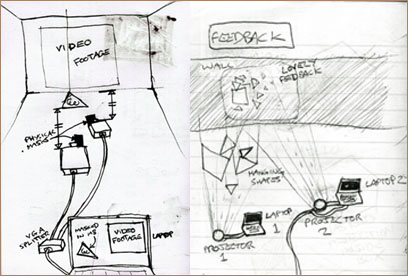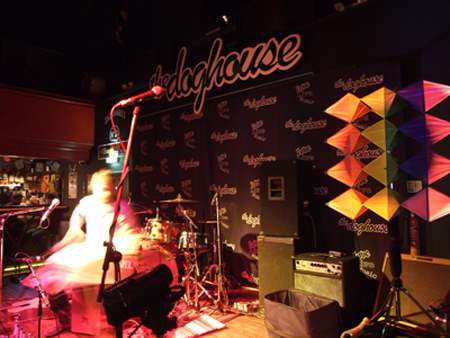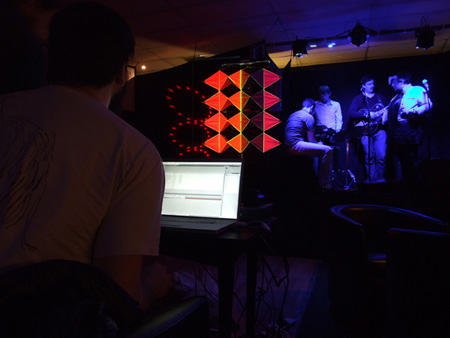26/06/09
- Projection Mapping
This hand drawn mapping film was the
culmination of a series of projection experiments (some of them
below) I did at NUCA. I'm not entirely sure I can remember why
I was doing these - I guess I had some sort of application in
mind. It was certainly a bit of a learning curve getting to grips
with the technique and the level of precision required for it
to work properly. The
sketch below is an illustration of the projector setup for the
hand
drawn
mapping, although I ended up doing it
slightly differently.
....
I didn't use any physical masks on the projector at all, and
the vga splitter was actually a ridiculously-expensive-and-hard-to-get-hold-of-at-short-notice
piece of kit called a DualHead2Go, which basically doubles the
width
of the laptop output so you can spread it over two projectors.
Which is what I did - one projector projecting the footage of
me drawing
the triangle, masked off to the shape of the hanging triangle
using Modul8 VJ software, while the other projector is projecting
the footage, unmasked, in all it's glory, onto the back wall.
I then filmed this whole setup and programmed Modul8 to transition
the back wall projection into a live feed from the camera I
was using to film it, which then generated the feedback effect.
Make sense? Good :)
All of these videos are based on the same principles,
some slightly less complicated than others. The triangles in
the video above were hung from my kitchen ceiling in Norwich
and the
projector
was
set up to project a photoshop file of a simple triangle shape
which was then manipulated live in Modul8 to match up exactly
with the edges of the hanging shapes. One frame of this manipulated
shape was then rendered and taken into after effects to be animated,
and then the resulting video projected back on to the hanging
triangles - the idea being that the camera movements alone
create the illusion of the shapes floating in space. The hand
drawn version was essentially the same technique, but I
was trying to get away from the horrible neon glow of the initial
tests, so I decided to film myself doing the shape
manipulation instead, cutting out the need for any fancy software
and resulting in a much nicer home-made 'Gondry' feel.
Again, same technique ^ but this time filming the subject in
front of it's output for yummy feedback. Below is a stop motion
experiment where I was trying to create the illusion that the
hollow side of the cube was actually solid by projecting light
onto the inside.
22/03/10 - Esperi
Me and my VJ buddy Garry met Esperi (aka
Chris Lee-Marr) at one of our first gigs a few months ago and we decided to work
together and have a go at doing some custom visuals for some
of his gigs. I thought it'd be nice to try something a bit different so quickly
put together a little test using a kite that my girlfriend Petra had given me
for christmas (I had yet to actually fly it at this point :) and the projection
mapping technique that I've talked about above.
This was all well and good as a test, but the real challenge would be to prepare
all the different animations so that they could be quickly adapted to the new
positions and angles that the kite and projector would end up in on the night
of the gig - I'd have to re-align all of the animations in After Effects and
render them all out again in the three hours I had at the venue before the gig
started.
In order to be able to do this quickly and efficiently I had to create a separate
parent composition in After Effects for each of the 24 triangles, which consisted
of just solid, still, constant shapes. I then took these comps and combined,
sequenced and animated them in new compositions so that I would only have to
tweak the positions of the parent shapes and all the comps that used them would
be
automatically updated.
I needed to create various other parent compositions too that were slightly more
compicated than the still triangles (for example the animations that manipulate
the edges of the kite) but the same principals applied. Having to work like this
was a bit of a strain on my tiny mind, and it presented quite a few limitations
on the kind of animations I was able to produce in the time I had available,
as I had to constantly go through the setting up process in my head and decide
if I could afford the time it would take to tweak a whole new set of parent compositions
on the night.
Here's an edit of the first gig at the Doghouse in Dundee - I couldn't use the
live sound unfortunately as it was a bit of a poor quality recording, so I put
together this semi music video to Takkat by Esperi himself.

Photo by Petra Scherer - more on Facebook.
I'll have some footage from our second gig together up soon with the actual audio.
Also, have a look at my Central
Station blog where I talk about the process and performance a bit
more (perhaps a bit more coherently, I'm not sure).
19/05/10
- More Esperi Gigs
I've had a couple more Esperi gigs now and I seem
to be coping with the setting up process a bit better these days.
We're gonna try and get some momentum going with a bunch
of gigs together in June, so I'll hopefully be able to improve
the visuals with each performance and try out new stuff as well.
This is some unedited footage from our second gig at Pivo Pivo in Glasgow...
And here's some footage from the last gig at Dexters in Dundee - it was
a really nice atmosphere there, with very low light which really allowed the
visuals to shine. Thanks to Petra for the photos :) - more of which on Facebook.

12/03/11 - Battles
- IPT2 - 3D Zoetrope Mapping
My latest 3D Zoetrope experiment, combining the sine wave zoetrope I did a few
weeks ago with some projection mapping, and IPT2 by Battles - here's what happened...
Pretty straightforward technique really - I just had a projector set up on a
tripod, pointing down at the zoetrope from above, and then masked off each circle
and spent a few days synching it up to the music. It's good to finally get some
sort of finished film out of this zoetrope malarkey :)

